ARTFUL ENCOUNTERS
Robert artfully walks through life as a positive force. Many people seem to sense his gentle, compassionate qualities and are comfortable talking to him. I can go into a fast-food restaurant, eat a meal, and leave. He can go into the same restaurant and before he leaves he will have eaten a meal, learned the life history and problems of a complete stranger, and will have given him or her excellent advice or encouragement.
He has documented many of his life events with stories, songs, and poetry. His written work can be found in his books, in stacks of old notebooks which I’m just starting to look through, and on dozens of files stored on several computers. His written stories and notes show Robert’s unique reactions and responses to encounters with people, animals, and situations. They reflect his humanity, his compassion, and his humor. He enjoys people and seeks them out.
One of his notebook entries dated May 12, 2003 states:
Carol believes I might be on Earth to give simple gifts to those in need. So it is that I speak with smiles and deep words and silent prayers for souls along the course of my journey. Ceremonies chanted in solitude, poems left for waitresses, meditation for a Nation.

Kristin's Birth and Early Life
I'm going to start with one of the most important people in Robert's life, our daughter, Kristin Marie Nichols. I'll tell you some about her birth and early life. We were so careful during my pregnancy—did all the right things. We had girls' and boys' names listed and ready for the big day. We had a crib, diapers, and a beautiful blanket of a non-gender color to wrap the baby up to bring him or her home from the hospital. I was thrilled—I was growing a new life inside of my body.
At this point I had put Robert’s contribution to the creation of this baby aside and mentally and physically took over the child-creating process completely. This conviction that I was solely responsible for growing our child came back to do severe, long-lasting damage.
Long before the projected birth date, Robert and I started planning the announcement of her birth and Robert wrote the words that would celebrate her new life. It was the time before home computers so we went to a print shop, picked out yellow paper the announcement would be printed on, selected the font, and went home to wait.
I still have the original draft of that birth announcement. The announcement was never sent and the beautiful words Robert wrote to welcome the new life were not printed until Robert wrote them in The Kristin Book seventeen years later. The link is to “Old Business,” a chapter in The Kristin Book (©1987). It tells about the birth announcement.
LINK to Old Business
These announcement words were not written again for fifteen more years when they were put into a multi-page card we gave to Kristin on her 30th birthday.
On June 7, 1970, Kristin was born with Down syndrome. Within her first twenty-four hours of life, the physician gave us his grim prognosis using the word “it” instead of “her” or “she.” The word “vegetable” was used to describe our new baby. I was told to think of “it” as nonhuman, put “it” in the state home, and go ahead and have another baby right away. Just “think of it as being dead” the medical professionals advised this mother of a fifteen-hour-old baby. The recommendation to put “it” in the State Home was followed with this explanation, “When it gets older, it won’t be able to walk and will be too heavy for you to carry. It won’t know you anyway.”
Not knowing what to do and being too numb and confused to follow our hearts, we decided to follow the directions of the nurses and physician authority figures and we did not bring her home from the hospital. We contacted a state office that arranged to put her in a foster home for care until she would be old enough to be admitted to the State Home. This decision was supported by the silence of our families. No one encouraged us to take her home. We left our beautiful baby in the hospital. I asked the nurses to be sure she was wrapped in the blanket we were leaving for her when the foster family picked her up. This began a three month nightmare.
On June 15, 1970, when Kristin was nine days old we picked her up at the foster home to take her to Denver, to the University of Colorado Medical Center. There she would be evaluated by the specialists in the Kennedy Birth Defects Clinic. It was an extremely sad time for both of us. These pictures were taken in a park in Denver. We were so sad and it shows on our faces.
One of the results of the evaluation was an analysis of Kristin’s chromosomes which indicated she had Trisomy 21, Down syndrome. We ultimately received a black and white photograph showing that on her 21st set of chromosomes there was a split, making three instead of two, the result being Down syndrome. It was a strange feeling to look at that small picture and actually see the third chromosome that would impact Robert and me, and, as perceived by my distraught mind, totally ruin Kristin’s life. I took full responsibility for this third chromosome on the 21st set. After all, she grew inside of me. Robert was so very sad, but very supportive of me.
Here is a poem Robert wrote about a meeting with the evaluators at the center:
The Manila Folder
They had your future in a manila folder labeled “Kristin Nichols.”
We saw it on a Denver summer afternoon.
It was deep in the thousand-celled, honeycomb clinic,
where people in white robes work
and people in street clothes wait.
“You see,” said the man of medicine
(kind and with eyes deep into the pathos
of helpless knowledge),
“on the twenty-first set there are three chromosomes instead of two.”
And we saw the blotches—carefully patterned by nature;
sorted, magnified
and printed by man.
“You see," he said
“all of the pairs and one triplet—
she’ll never be
a computer programmer,
or a secretary,
or a lady taxi cab driver.”
and then we left, you were so small—
a dozen days or so at most—
and already we knew you’d never like
James Joyce.
From “The Beginning,” The Kristin Book (©1987)
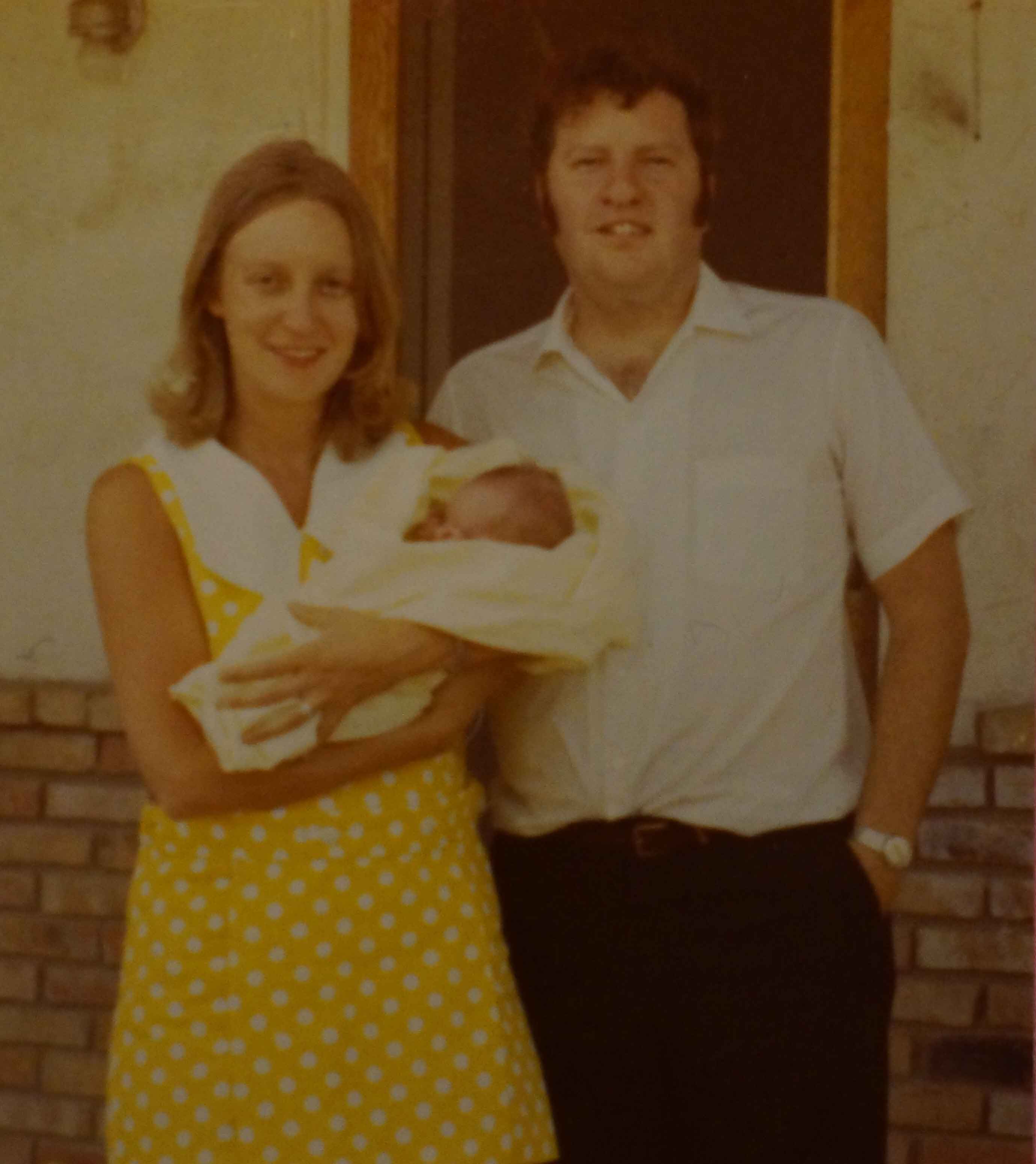
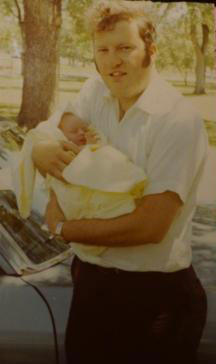
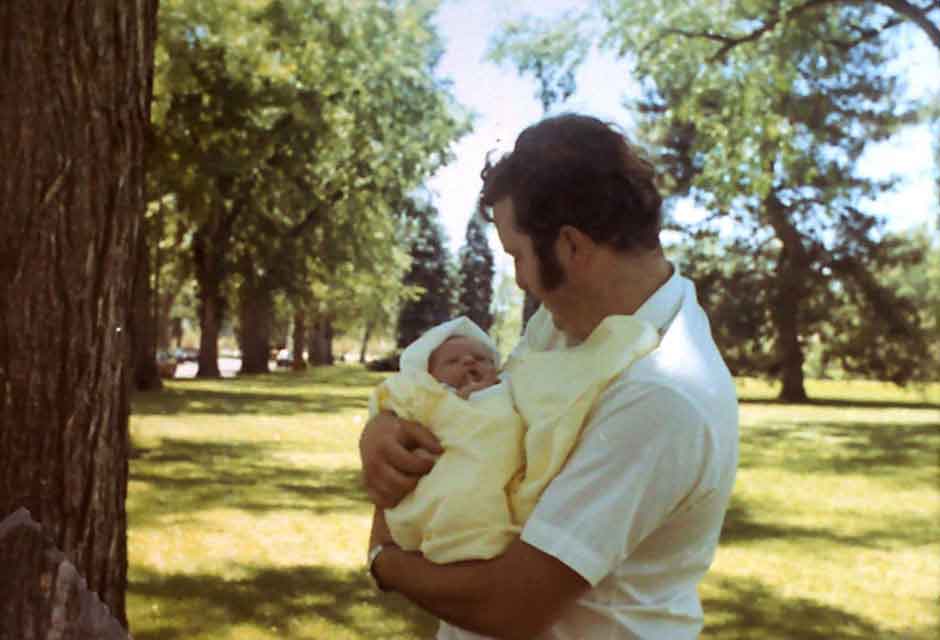
Over the weeks, guilt was becoming overwhelming and was rapidly leading to serious, long-lasting depression. During some of the days after her birth I would drive to the street where the foster home was located, park the car at the end of the block, and stare at the house. We played gin rummy throughout the nights because I couldn’t stand the darkness. Sometimes I planned suicide.
We didn’t talk much about our disastrous situation. I couldn’t think of anything else but the situation. Robert had always been careful to protect me from harm and sorrow. I didn’t learn until years later that he felt talking about it would hurt me more. I felt pretty much alone in my grief. We’ve learned a lot since that time.
Finally, we decided that despite the dire predictions of the doctors and some of our relatives, we couldn’t stand it any longer. The foster-home documents were cancelled, and we picked up Kristin and started our lives with her. Below are excerpts from Robert’s writing. “The Crib” is from The Kristin Book (©1987). In it reference is made to Kristin’s crib and to Kristin peeking around a curtain. (Living in a converted garage meant leaving behind some amenities like a wall dividing the living room from the bedroom. Kristin’s crib was in the bedroom near the curtain which substituted for a wall.)
LINKTO essay: The Crib
Kristin was developing into a darling little girl. By six months she was standing in her crib and was already exceeding the predictions of the doctor who said she would never be able to walk. I was delighted with this beautiful baby, but still seriously depressed.
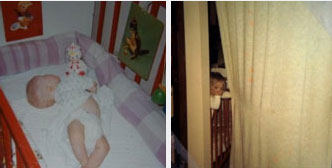
December 1970

January 1971
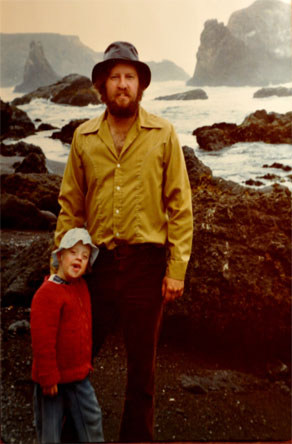
Robert could still make me laugh, the three of us traveled together, and we did have fun. Robert started writing The Kristin Book (©1987) when Kristin was six. It wasn’t completed until 1987. When talking about writing this book he said,“It took ten years to write a hundred-page book. It wasn’t easy facing those early fears and doubts that choked hope before we had any idea of what a wonderful life we were to know with our daughter.”
It was impossibly difficult to live like this, but Robert was never impatient about my mental instability, always supportive, always giving his love. Thankfully we had several friends who were tremendously helpful during these times. Their stories are included in “The Path Least Taken.”
Kristin continued to develop into a happy little girl. She was a joy for all to know.

When Kristin was three she developed near-fatal pneumonia. Shortly after recovering she began to lose all of her hair and her eyebrows. The doctors didn't know if this was the result of the high fever, the heavy medications she received to help her survive, or if it may be a trait infrequently associated with Down syndrome. We were told to stop taking her to doctors and to accept the fact that she probably would remain bald for life. She wore little cloth hats to protect her head from the Colorado sun. By the time she was four we had found a place where we could buy wigs and have them cut down to fit a small child's head.
The reason I mention this relates to Robert's devotion to Kristin. Kristin was afraid of the wigs. She didn't mind looking at them or holding them, but she was afraid when one was put on her head. Robert starting wearing her wig around the house. (It was a small-size wig so it just perched on top of his head and he looked very strange.) It always made Kristin laugh and she saw that it wasn't hurting her dad's head. Gradually she became comfortable wearing it. Now, nearly forty-years later, she still wears a wig.
(Robert's 1987 book about the first sixteen years of Kristin's life, The Kristin book , has been republished as an e-book. This edition includes an added section, The Kristin Book: Update 2013. It is available online at Amazon, Barnes and Nobel, and other internet distributors.)
Robert, the Philosopher
Robert is a scholar, observer, analyzer, and a thinker. He is usually always ready to offer wise advice to Kristin and me when we seek it, and sometimes when we don’t. One time, when Robert was expounding at length about something, Kristin and I were sitting numbly with glazed eyes. I looked at her and asked if she understood what her dad was saying. She shook her head no and joked, “When Dad philosophizes, sometimes I just smile and quit listening.” But we do listen to his wisdom. It guides our lives.
In 2001 Robert created “The Five Great Truths of Uncle Bob,” (©2001) which he sent to his nephew for his 40th birthday. “The Five Great Truths” succinctly presents Robert’s philosophy of life.
LINK to the file: The Five Great Truths of Uncle Bob
He believes guilt related to past actions wastes the precious time we have now. In the decades we have been together his philosophy saved me from searing guilt that could have ruined my life.
Kristin Grows Up
Life isn't always easy for Kristin, and therefore, for Robert and me. Her pain is our pain. Robert is an extremely strong man but cruel remarks to Kristin cut him deeply. She has successfully met the challenges that come with “being different.” She was called "retard" and “retarded bitch” by children when she got on the school bus and taunted terribly on the playground. There were times they pulled off her wig and played "keep away" with her running from one child to another trying to get it back. Kristin endured many difficulties as a child she didn't tell us about until much later. She protected us from as much grief as she could. She is a very strong person, like her father.
For over thirteen years Kristin worked at a Denver supermarket as a courtesy clerk. Most customers were nice to her, but occasionally someone could be very insulting and even cruel. One woman pushing a grocery cart with her child saw Kristin on the parking lot and told her that people like her shouldn’t be allowed out in public—that she was dangerous to children. Kristin was devastated. We hurt terribly and raged for her.
Most every day, Robert, in his wisdom, gave Kristin some version of the same advice. As Kristin got out of the car, Robert would say, “You have to forgive the fools every day. Give them your heart. Don’t expect the world ever to be as nice as you are. They are lucky to have you.” Kristin is tough and not bitter or angry. Robert and I are only semi-tough when it comes to Kristin and we don’t handle this nearly as well as she appears to handle it. We both wonder how much sorrow she keeps from us. She protects us from knowing.
Kristin is the core and heart of our small family. We love her so much and are proud of her and of all she has accomplished. According to the professionals, her life would be one lived as a vegetable and the baby girl they referred to as “it” turned out to be a magnificent woman leading a wonderful and valuable life. In “The Path Least Taken” I have included some pictures and information about Kristin’s adult life. Kristin, like her father, certainly qualifies as a person who is beautifully unique and does take “the path least taken.”
Our very special friend. Dorothy Snozek, has been a stong advocate for Kristin and always celebrates her accomplishments. For decades, she has been an empathetic listener and advisor for us regarding Kristin's welfare and health.
The Relationship between Robert and Kristin
Robert, Kristin, and I have always had a beautiful relationship. The three of us laugh, cry, talk, sing, dance, and play. We are a small, but strong, team. However, the relationship between Robert and Kristin is very special and dear. Robert has written songs for and about Kristin, written poetry specifically for her, and has created wood carvings just for her.
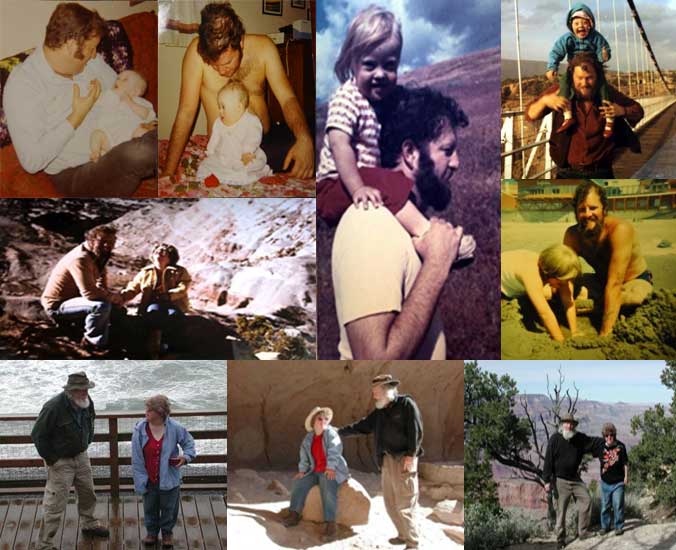
Robert is an extraordinary father to Kristin. He loves and respects her. They make each other happy. In a notebook entry dated March 28, 1988, Robert wrote:
Kristin grabs her purse and with a smile and a quick wave, departs the restaurant where we have eaten breakfast together. Through the window I watch as she walks to the intersection, waits for the light, confidently crosses before the revving might of six lanes of traffic, and, with another wave flashed across the street to where she knows I am measuring her every step, disappears into the Arby’s to commence another day’s work. May all the good fathers of the world feel such a proud moment as this.
He comforts her during times of sadness and helps her heal when she is sick. He held her upright all night, every night for weeks when Kristin was very young and suffering from respiratory problems. When we sense she is sad, Robert invites her to go on a long ride with him during which she always relaxes and tells him the problem. She listens to and trusts his advice. In turn, she is extremely sensitive to Robert’s (and my) needs, offers sound advice, and gives tender comfort.
I found the following words which he wrote in his notebook on February 28, 2000, after having received a letter of devastating news from his publisher and was terribly “down.”
“I told Kristin about the publisher and the end of 'High Priest' and of me, the author, and she hugged me and said, ‘You’re still my Dad.’ And later when I mumbled on about being invisible to this world—strangely, non-existent in this world, she said, 'I think this world is you and Mom and me—the three of us, and Mickey, the dog.'"
Artful Gifts from Robert to Kristin and to Me
On June 7, 1997, Robert wrote the following to Kristin for her 27th birthday. He made a box that a prism would fit in and gave it to Kristin.

The Rainbow of Your Smile
When you give the day your smile—
one that starts in your heart,
glows in your eyes,
vibrates through your actions;
the Light and Love of the Universe
shines
through the prism of your soul
and touches the whole world.
And believe me
all about you,
in subtle splendor
or outright arching radiance,
you make such beautiful rainbows.
June 7, 1997
When Kristin turned thirty, Robert wrote the following poem.
June 7, 2000
Kristin’s Thirtieth Birthday
Who could have known
that Sunday morning thirty years ago?
Who could have known what the gift was that day?
And when the doctors
spoiled the celebration with
their crude and hopeless notions of
your soul,
who could have known what laughter we
would have together, we three;
what miles we would travel;
what sweetness we would gather
from the years?
Thirty years . . .
Thank you, my child.
Happy Birthday.
Love, Dad
June 7, 2000
In the fall of 2000 when Kristin was thirty, she left home and moved into her own apartment where she lived independently for over six years until we all left Colorado and moved to Oregon. There is more about her move in “A Path Least Taken,” Kristin Grows up.
Robert made a wood carving for Kristin on her 35th birthday. She was so moved and was in tears when I took the picture.
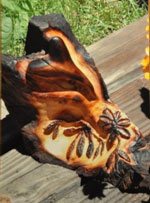
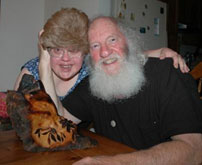
Robert also creates gifts of art for me. One joy for me is my flowers in summer. Robert is always willing to do the work I can’t do: haul bags of soil and dig the ground. But one of the most wonderful things he does is comment on how these flowers make our environment beautiful, and he thanks me for that. On my birthday in 2006, Robert gave me a spiral-bound book which started with the following writing and dozens of close-up pictures of my flowers.
2006 Carol’s Lovely Garden. . . flowers for the soul
In quiet still cool of early summer morning,
from back porch vantage,
I stand and relish yard and garden before me
as Mickey-the-Dog enacts rituals of sniff and christen
about niches of bush and vine
and through stem-jungle shadowland beneath flowers . . .
flowers like song—a color-wild chorus
blessing day;
blessing me!
Robert/November 2006

Each day of my life
is touched
by the garden
of your love.
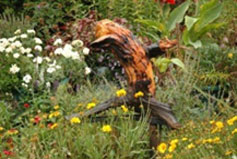
Robert's carving, Leaping Man,
joined my garden in 2006.
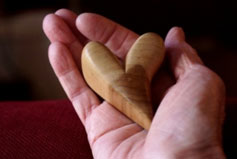
He carved this cedar heart for me for no occasion at all. He smoothed it until it felt almost soft to the touch.
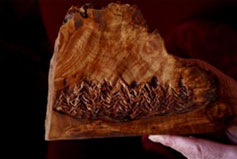
This is the carving he made for my birthday in 2011. On the back he has engraved "Carol, with you beside me, beauty becomes real." Love, Robert 2011
Artful Encounters with his mother-In-Law
My mother, Bernice Riehl, was living in St. Louis when Kristin was born. She was devastated when we called to tell her Kristin had Down syndrome. She was in distress about Kristin and about my declining mental state. There wasn’t anything she could do but be supportive. Mom came out from St. Louis to help me. She held her grandchild for the first time on the day Robert and I picked Kristin up from the foster home to take her to Denver to be evaluated at the Kennedy Birth Defects Clinic. Kristin was nine days old. It was such a sad meeting between my mother and the only grandchild she was ever to have. Mom didn’t know if she would ever see Kristin again.

June 1971
My mother was delighted when we brought Kristin home permanently and immediately started knitting everything she could think of: booties, sweaters, and little caps. She was busy, involved, and happy. Robert wrote of this in “Ice Cream with Carol’s Mom,”
“ . . . knowing her through the years as Kristin’s grandmother, who, with knitted booties and stocking caps, wove her heart about the fragile early times of Kristin’s difficult promise and who, in ensuing years, was ever there to cheer Kristin’s triumphs over the bleak prophesies of her birth. . .”
In The Kristin Book (©1987), Robert wrote the following:
Grandmother Riehl and her prolific knitting needles and her prolific heart turned out seasons of sweaters and hats and mittens. Seasons of wool twisted and knotted into garments of love, ever increasing in dimension.
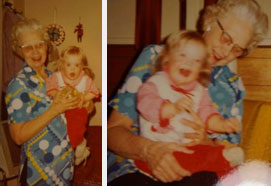
Through the decades Mom provided Kristin with support and Kristin knew she was loved.
Five years before Kristin was born, I announced to Mom that Robert and I were going to get married. My mother was not happy. She had known Robert since he was seven and she liked and trusted him. When I turned sixteen (and Robert was a mere fifteen), she would let me drive to run errands for her in the evenings – picking up clothing that had been altered and going to the store. She would always say, though, “You can drive there yourself, IF you call Robert and he can ride along with you.” She didn’t want her sixteen-year-old child driving around St. Louis in the evening alone. So, while she liked Robert, the hitch-hiking, bearded person was, in her mind, not husband material for her only child. Robert, however, always treated my mother with respect, patience, and a great deal of kindness and compassion. Robert was incredibly good to my mother during the many decades he knew her, but during her final difficult years, Robert was exceptional.
He describes one of these compassionate encounters with my mother in “Ice Cream with Carol’s Mom,” The Great Book of Bob, (©2009).
Just in case you decide not to read the whole story in the link, I want to make sure you read part of a sentence he wrote where he describes my mother’s dementia. I think this is an incredible statement regarding her disassociation and loss of memory:
“. . . with memory lost to but fleeting recollection of a past that had become tiles of a shattered mosaic . . .
LINK TO essay Ice Cream with Carol’s Mom
Sadly, my father, Clarence Riehl, died before Kristin was born. He and Kristin would have had so much fun together and would have shared so much love.
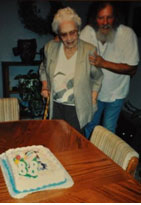
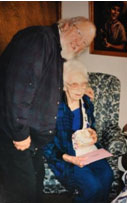
1992, Mom’s 88th Mother’s Day,
Birthday 1997, Mom was
almost 93 years old
Robert's Parents
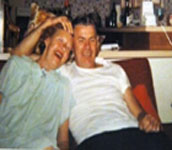
Robert, Sr. and Hattie Marie Nichols were good people. I was fortunate to know Robert’s parents from the time I was eight, and they gave me a friendly welcome to their home every time I came over.
Both were musical. His father was always eager to pound out a rousing tune on the piano or grab his old guitar and play and sing. His mother was full of fun and music, too. Sometimes she would get out her ukulele and join in.
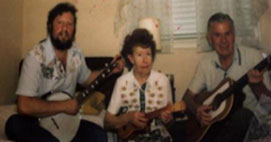
When they were young, both Robert and his sister, Nancy, were surprised to find out their mother was a wiz on the piano. In the link below, Robert describes the day their new used piano was delivered to their home.
LINKTO Essay The Family Piano
Robert’s mother was a wonderful, little, red-headed woman. We all loved her. In the mornings I would walk over to the Nichols’ house to get a ride to school. His mom was always happy to see me. Robert described her on these before-school mornings in part of a story in The Great Book of Bob (2009).
Mother, who even in the warmer days, was wont to don her massive winter coat and head scarf (I think it might have had something to do with disguising a nightgown and a long succession of less-than-perfect hair days) would emerge from the back door, fight her way through the cloying mews of voracious cats as she made her way down the back steps,and, then, looking much like an Eastern European refugee lady, swing into the driver’s seat veritably singing the words, “Good morning!”
Robert’s mother and father loved Kristin and she thrived in this love.
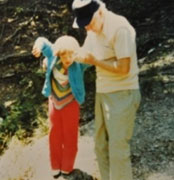
Granddad helping Kristin
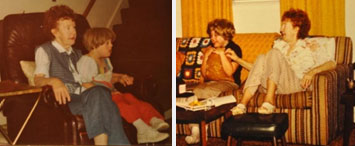
Kristin and her grandmother are watching soap operas together.
I was going to use Robert’s writing to describe this woman to you, but in looking through his writing notebooks and computer files, I couldn’t find much. There was one short piece about this lack of writing about his mother in the following excerpt from, “Just a note about my mother. . . ” The Great Book of Bob (©2009).
In my writing, my mother is just a trace of beauty, the hint of an angel. She deserves more. She was flesh and hilarity and tears and foible and songs off key and cuddle-my-soul and swat-my-bottom real. She needs to be made tangible by the best of my poetry, the sweetest of my songs. And, I really need to tell the stories of our times . . . and to tell the last time she knew me in an instant’s gift of clarity in the hospital room with ‘Deck the Halls’ coming in through the piped-in music. I need to define the touch of her immortal soul that yet graces all my living days. I need to tell what I say to her when I visit her grave.
It’s hard though—almost like telling her story will end it.
I sure don’t want to do that.
The Great Book of Bob (©2009).
I have found several references to her in his notebooks. Here are two of these:
Last night, my father, a little drunk, a little sad, called to remind me it was fourteen years ago that my mother died.
Her love was—is such a blessing to me.
January 20, 2000
So, when beginning my long journey home after a visit with my dad, I was called from I-95 traffic and road-bliss freedom by the sweet-sad whisper of my mother’s grave. Exit 150: Quantico National Cemetery. The last time was in the fall and it was a steady late October drizzle and I stood in the trees across the road and lawn from Section 23 and wept the best of tears. (May 23, 2003)
Two Important Songs
Good night, Irene
From the time I was a little girl going over to the Nichols’ house for a ride to school or to visit my best friend Nancy and to laugh at the funny things her younger brother, Robert, said and did, I remember their father playing the guitar and singing, “Good night Irene.” As Robert got older and started playing the guitar himself, they would play many songs together, but usually always, “Good night, Irene” was included. His dad was a natural at harmonizing.
Robert and his father traveled together. They drove to Nova Scotia, Florida, and several times Robert drove him from Virginia, round trip out to California, and later, Seattle to see Nancy and her family. They took one trip in September 2000, and were on the road on the day of his dad’s birthday. This is an excerpt from Robert’s writing describing what happened in the motel early in the morning of his dad’s 86th birthday.
I was up early and in the dawn-shadowed room I quietly strummed my guitar. He stirred awake, the dog gave me a sweet little bronchial grunt and I started singing, “Good night, Irene.” It was on my second round through the chorus that the harmony began. From under the rumple of bed clothes and dog wallows where my old father and his pooch were emerging from the struggle of a night’s rest, there came the purest tones of high tenor harmony I’ve ever heard.
“Good night, Irene; good night, Irene; I’ll see you in my dreams,” we sang, my Dad and I.
“Happy birthday, Papa,” I said.
“Thank you, Robert,” he replied.
From “A Good Trip” ( . . . travlin’ along, singin’ a song . . .), Summer
Words (©2001)
“You Are My Sunshine”
“You Are My Sunshine” is another song Robert’s father played and sang often. Robert sings it often in our home. Kristin grew up knowing the song and now she plays it on the banjo which Robert taught her to play.
Robert’s dad has been described as insensitive. He could say things that hurt and you could never be absolutely sure that he wouldn’t say something too loud in public that would humiliate you. But he was a good man, good to Kristin and me, and there was never any doubt he loved Robert, Nancy, and their mother. What he did the last years of Robert’s mother’s life also deserves to be mentioned.
Robert’s mother suffered from dementia and as time went on she needed more and more care and supervision. Through these years at the end of her life Robert’s father took care of her alone and it almost killed him. Robert would travel to Virginia from Colorado at least twice a year, but his dad was the full time caregiver. Over time we could hear his dad’s voice weakening over the phone. He was aging rapidly and we feared for his health, but he refused to put her in a care facility until she became too ill to stay home during the last couple of weeks of her life.
Robert wrote about this in “The Insensitive Man” in Adventures in the High Wind (©1990).
LINK TO The Insensitive Man
The Magic Christmas - 1984
Robert, Kristin, and I flew to Virginia on December 26, 1984, to celebrate a late Christmas with his mom and dad. We didn't expect too much. Robert’s mother was declining. She could still recognize us, but she lived in a state of confusion and forgetfulness. We arrived to happy greetings from both of them. They were both so glad to see us, but it was obvious his mother was mentally moving away from us and that was so sad. The five of us talked for a while and then Robert’s dad announced he had bought a Christmas tree and it was in the basement rec room.
It must have seemed to everyone that decorating a tree with this sadness would be a mechanical set of moves, and no one responded. Robert’s dad had taken this surprising step to have a celebration and no one had the heart to do it. I felt bad for his dad and announced enthusiastically that it was time to decorate the tree.
Downstairs, the tree and the boxes of decorations and lights were already out. Robert’s mom was sitting while everyone unpacked and untangled the decorations, but she was mentally removed from what we were doing. At this point it looked like his mom wouldn’t be able to participate in this decorating party. I felt we were doing this for his dad who obviously had hoped this would be a celebration like old times.

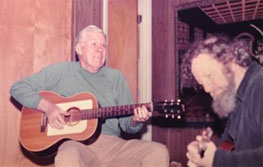
The Nichols had brought their old upright, out-of-tune piano with them to Virginia when they moved from St. Louis. Some of the ivories were off and Middle C had long ago been muted by Robert’s dad’s enthusiastic playing. If a piano was in the room, Robert’s dad was unable to resist playing it and so on this tree-decorating night the music and singing started.
The celebration was truly coming alive with guitar duets and more singing. His mom started singing joyously.
Like a miracle, the music had brought his mother back to us and she joined the music and was dancing, and talking. The look on her face changed and she was alive and was an active participant in the celebration.

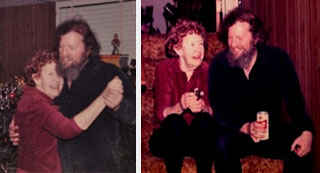
She and Robert danced and then sat on the basement steps and laughed and talked while the music played on.
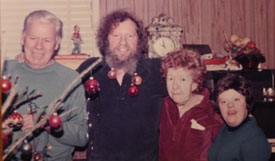
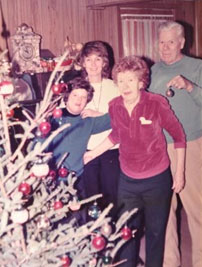

All of us decorated the tree together. It was wonderful and everyone was so happy. It was becoming a Christmas to remember.
The tree was decorated and it was time to get pictures of our creation, but by this time the music had stopped, and Robert's mom was mentally moving away from us. You can see this in the final pictures.
Robert, Kristin, and I call this magnificent night, “The Magic Christmas.” This celebration of dancing, singing, playing of music, talking, enjoying, and loving each other was the last time the five of us would ever have together. If Robert’s father hadn’t been thoughtful enough to think to buy the tree, this magical night would never have happened
In the latter years of his dad’s life, Robert visited every three or four months. He would meet his sister Nancy at the Seattle Airport and they would fly together to Washington, D.C. Nancy would clean his dad’s kitchen, steam-clean the furniture and the rugs, and paint the walls. Robert would fix all that was broken, cut wood to be used in the fireplace in winter, plumb, rewire, and do other jobs.
They would join their dad on his regular routine of a morning trip to McDonalds with Beezly, the dog. Then they all drove to Veteran’s Park to walk, feed the squirrels, and watch the ducks and geese. Robert loved these drives with his dad and his sister.
Though Robert’s dad was seldom one to compliment Robert to his face, he bragged about his music and his accomplishments to everybody else he talked to. While visiting, Nancy caught images of the pride he felt for his son.
This is a photo of Robert hamming it up after hauling a large old refrigerator out of the basement and loading it into the little Subaru station wagon by himself. Notice the look of pride and amusement on his dad’s face as he watches from the doorway.
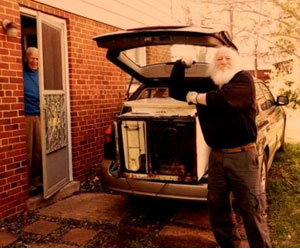
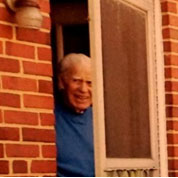
One evening as the three of them sat around singing songs, Nancy took a video of Robert playing a new song. This video is on You Tube. While watching it, notice his dad.
Robert’s and Nancy’s father died in his sleep on July 2011 at age 96. He was alert and sharp until the end. They found the newspaper from the day before with an almost-completed crossword puzzle on the table by his chair downstairs.
Robert conducted the funeral service the way his dad had asked it to be done. Robert played his guitar and sang songs that were favorites of his father. In introducing each song, Robert told something about his dad that related to the lyrics of the song. It was the most beautiful and touching ceremony I’ve ever seen. I was so proud of Robert and I know his dad would have been so proud of him, too. For the last song, Robert asked everyone to sing along as he played “You are My Sunshine.” It was the perfect way to send his father off.
Robert and his Sister, Nancy Sue Nichols Thomas

Nancy is one of those fortunate women who never gains weight and never ages. While I wrinkle, sag, creak with arthritis, and gain weight; Nancy remains slim, youthful, and agile. Where is the fairness to that? Also, she is a very talented artist, creating some of the most beautiful greeting cards and quilts I’ve ever seen. A few years ago she made Kristin a beautiful quilt. When putting it over herself at night, Kristin says she feels like she is being covered by love from her aunt.
Nancy is game for anything and when she comes from Seattle to Oregon to visit, she kayaks, boats, and one time, was willing to head out on a very rough ocean with us to go on a guided whale watching tour. She has been my friend since we were eight years old and in all the decades I’ve never seen her (or anyone else) as green in the face as she was on that wild, whale watching trip. Nancy and Robert are close siblings and their mutual love and admiration for each other are obvious. Robert’s first encounter with public education was in a two-roomed school house. This is what he wrote about his first day of school.
“. . . and the good feeling that in a two-roomed school house my sister in the second grade row was just one row over from me in the first grade . . . “
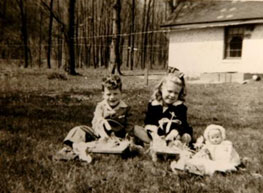
LINK to essay: Mr. Smith
Further on in this essay of life with his family in the 1940s he wrote, “At our old school Nancy had almost always been there to rescue me from the bullies of the third and fourth grade rows . . . “
Nancy is one of the few people alive who has known Robert longer than I have. She and Robert have shared many experiences.
A favorite story of mine is about a 1940s encounter Robert and Nancy had with a garbage man named Mr. Smith. It is from The Great Book of Bob (©2009). This picture shows Robert and Nancy in their backyard at the Trav-L-Tel Motel in St. Louis County about the time of this experience.
Encounters with People Who Need Help
Robert is a compassionate man under any circumstance, but probably because of Kristin’s disability and the social problems that go with this, he is extremely aware of the problems a person with special needs has integrating into society. Some of Robert’s stories focus on this. Here are some samples.
LINK to Small Child
LINK to Encounter
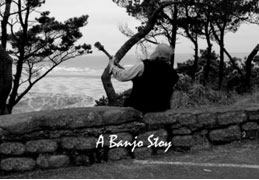
The Banjo Story
Another example of Robert’s compassion shows in “The Banjo Story” in Uncle Bob’s Big Book of Happy (©2012) This picture was taken in the parking lot where Robert encountered the people in this story. There is a link to this story below.
LINK to Banjo Story
The Beleaguered Waitress
Robert loves to travel and on these trips he meets many people. On one of his trips he left a poem for a waitress in Gatlinburg, Tennessee, and he explained in one of his writing notebooks, " . . .based upon our short conversation, I saw in her someone who, far beyond the rude expectations of her bosses at the restaurant, was a person who was likely a wonderful mother and loyal and beautiful wife and friend. I told her she was worthy of love.” He writes about this encounter and the poem in “Details of a Vision,” The Great Book of Bob (©2009).
LINK TO The Waitress and the Poem
Another very short story is about an old lady Robert watched one day.
LINK TO Wealth
Robert and Animals
Robert has respect for all life. While he’s not one to seek out animals, he has been closely involved in the lives of several types of animals. There are many tales of Robert’s encounters with animals. Here are a just a few descriptions of his involvement with them and several examples of creative work that resulted from these encounters.
As we drive along the highway, he says a silent blessing for the beautiful road-killed animals lying dead along the road.
While trying to corral Kristin’s two rabbits late at night in the backyard, Robert probably showed the neighbor lady more of his flesh than she ever wanted to see (several times). He wrote a song titled, “Benny, the Bunny,” and had many other rabbit experiences too numerous to include.
He climbed up a tree and down a storm drain to rescue two birds tangled in nylon fishing. Both would have been doomed without his help.
Robert maneuvered his kayak to cut loose a beautiful, small duck, entangled (almost underwater) in fishing line.

He successfully performed the Heimlich maneuver followed by mouth-to-mouth resuscitation on his dad’s dog Beezly who was choking on a White Castle Hamburger.
In “Horse Tales” (The Great Book of Bob ©2009), Robert wrote an essay which describes his mishaps with Joe, a horse I owned when I was young; with a mountain horse who thought itself to be a dog, with a dog who smiled toothy smiles, and with a demon cat.
A good morning from Rebel
LINK TO: Horse Tales
Robert and the Family Dogs
Robert would never have thought to initiate the addition of a dog to our household, but because I love dogs, he welcomes them into the family. Quickly his initial “like” of the dog turns to true, loving affection. Robert’s affection for a dog is more controlled--no baby-talk to the dog from him. Kristin and I, on the other hand, start out thrilled with love for the new dog and this quickly morphs into full-blown, head-over-heels love.
Robert’s writing isn’t always profound, beautiful, or inspirational. Sometimes it’s just fun.
On February 2, 2010, Robert drew the sketches and wrote the following poem in his writing notebook.
“Oh, I’m a dog from tail to soul,
I drink my fill from a toilet bowl."
"And I’m a cat and, as it were,
for your consent, don’t give a purr."
And, happy fool, a pet-ophile—
I buy their food; They make me smile.
2/2/10
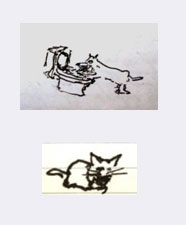
I’m telling these stories to show Robert’s kindness and patience with our pets. I’m also including these stories about the dogs in our lives because they show Robert’s love and respect for all life.
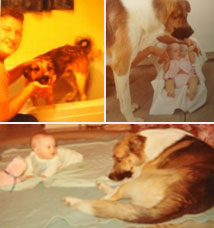
Robert and Auty
Somehow Robert always seemed to get stuck with all the unpleasant jobs related to dog ownership. In 1969, he used gallons of tomato juice to attempt to rinse the vile odor of skunk spray off our first dog together, Auty. (We got Auty on the day of the Autumnal Equinox, hence the name, Auty.)

The puppy we brought home was the beginning of sixteen and a half years of trying to coexist with a being that was a mix of troll and billy goat. Willie ate, chewed, and shredded everything, and dug holes in sofas and car seats. He was an unconscionable, crabby, black and white fellow who was in a constant state of shedding hair-- 24/7, 365 days a year. Willie tolerated only a few people, but he loved the three of us and we returned the love to the little devil.

Willie giving us the "evil eye."
Robert and Willie
In 1984, some years later after moving and living in an apartment, we rented a house and Robert bought me a puppy for his birthday. Now that’s what I call a good guy. The puppy was a mix of a basset and whatever the male dog was up the alley. Kristin named him Willie after Willie Nelson.

Willie did whatever he wanted to do. He knew when he was doing a bad thing, but he truly did not care and never had any regrets. He would look around to see where everyone was seated and gauge the distance between us, himself, and the lamp table he planned to hide under after committing the crime. Then he would “break a major rule” right in front of us, escape under the table, wait until we exhausted ourselves yelling, and then he would nonchalantly stroll out, climb on the sofa, curl up, and with a contented sigh, go to sleep.
For a while Willie competed with Robert for Alpha male in the Nichols’ house. One day, in a particularly bad mood, Willie growled and bit Robert. Robert growled back and bit Willie. After that there was an unspoken agreement between them to be co-Alpha males. Robert put up with a lot because of my love for dogs.
Willie was a climber and was able to get himself up to unusual places. The problem was, he couldn’t get down. Periodically, Willie would somehow get up on the edge of our retaining wall in the back yard. He would wait patiently to be discovered and for Robert to rescue him.

One time I found him on the kitchen counter, stooped low under the microwave shelf, again waiting for someone to save him.
In Willie’s last few years he developed arthritis and it became impossible for him to go up and down the steps in order to come and go outside. In 1998 Robert built an ingenious series of platforms and adjoining ramps that enabled this maverick dog to get in and out of the house without trouble. The first day, Robert showed Willie how to maneuver this by helping him get from the kitchen to the back yard. Willie then decided to try getting back in on his own. Halfway up the first ramp that demon of a dog stopped, turned his head over his shoulder, looked directly at Robert and held that gaze. We both are certain Willie was experiencing his first feeling of being grateful. I’m prone to anthropomorphize, particularly about a pet dog, but it sure looked like “Thanks, Robert.” to me.
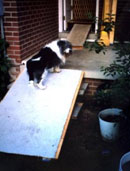
Willie died on January 1, 2000. This is what Robert wrote in his notebook on that day.
I found Willie, our 16 ½ year old basset, dying in the bathroom, legs thrashing, drooling, throbbing in throes of a final and terrible seizure. Carol and I took him to a veterinary hospital and had him relieved of life. It was a sad and beautiful act of love. The drug they use is instant and easy. Death waits just beyond every breath. “Bless the old son of a bitch. Let him go!” I told Carol. “Now he can reincarnate into the Tasmanian Devil he was always meant to be.”
Robert and Rainbow
Rainbow had joined Willie in 1986. We found him as a very young puppy, injured and wobbling down a mountain road after obviously spending a cold rainy day in the wild. The vet said people frequently throw puppies and kittens out on these isolated roads high in the mountains. In the link you can hear the song Robert wrote about finding Rainbow.
Rainbow had some irritating quirks. He ate several of Robert’s favorite and irreplaceable T-shirts. He also pulled up and ate my bedding plants (including rose bushes with thorns) as fast as I could put them in the ground. But he was a lovable guy otherwise. Robert, being who he is, carried no grudge about the T-shirts, at least not for too long.
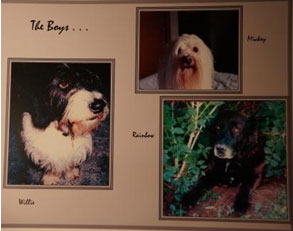
Robert and Mickey
Mickey, a sweet Maltese, joined Willie and Rainbow in 1996. I called the three of them, “The Boys” because they reminded me of a rag-tag group of men referred to as “The Boys” in John Steinbeck’s book, Cannery Row. One time Robert surprised me with the following pictures of this ungainly group of dogs.
Robert’s compassion and willingness to help our dogs came out strongly with Mickey and his serious health problems.
In one of Robert’s writing notebooks, I found the following notation:
Mickey my friend, the little white dog, the spirit beast (life and yelp), is gravely ill. Something to do with his liver they think. Two weeks of holding on and then today his small body was puffy with fluids and I had to give him to the vet hospital for care.
Maybe he’ll be all right. Tonight I circled the hospital with my spirit feathers and I left him a dirty sock to sleep with.
Who says I don’t pray.( May 2001)

Years later Mickey developed a problem with chemically breaking down food to be digested, and the vet said there wasn’t much hope for him. I was a mess, but Robert got into the kitchen and using the blender, concocted an ugly mix composed of baby Pedialyte, a supplement from the vet that broke down protein, chicken noodle soup, and other disgusting, but nutritious foods (mostly human food). He then used a large syringe and forced the food down Mickey’s throat. Gradually, Mickey started to improve and Robert moved him to more traditional solid, human food, but Robert would chew this food to break it down before hand-feeding it to Mickey. Much to the amazement of the vet, over time, Mickey was able to chemically break down food on his own. Because of Robert, I had my Mickey with me for three extra years.
Robert and Jesse
Jesse came to us in 2009 because he had nowhere else to go. He suffered from seizures and my cousin asked me if we would take him, knowing that with my love for animals I couldn’t say no. I asked Robert what he thought and he said if I wanted the dog he would go get him. Jesse was in St. Louis at the time. It was arranged that my cousin’s son who was driving from St. Louis to Jackson Hole, Wyoming, would take Jesse that far. Robert drove to Jackson Hole, picked him up, and brought him to Oregon. Jesse was a big, big guy. He was such a sweet dog. He was a quiet, gentle, and a truly, loving soul.
Jesse and Robert bonded on the trip from Jackson Hole to Oregon and Jesse had special feelings for him.

Jesse was immediately welcomed into the family. Little Mickey was still with us and put up with this addition without a problem. Jesse loved to be comfortable on our sofa. (We ultimately designated it as "Jesse's sofa" and it was no longer used by humans.) We put bed pillows (never again used by humans) at either end of the sofa and Jesse used these pillows exactly as they were meant to be used. Apparently he couldn't get a good night's rest without his pillows. Usually about midway through the night, Jesse would get up and move so he was facing the opposite direction on the couch. One night (about 4 a.m.) during one of these moves, he accidentally knocked one of his pillows off the sofa. Jesse got off the couch and went to a sound-asleep Robert, stood by him and breathed on him until he woke up. Jesse walked to the pillow on the floor and looked back at Robert. Robert got up, put the pillow in its proper place, Jesse got back on the sofa, placed his head on the pillow, and promptly fell to sleep, leaving his buddy, Robert, wide awake and smiling in the dark.
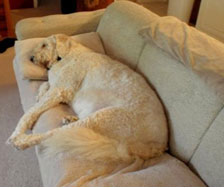
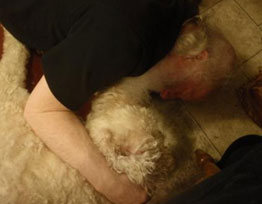
Over the three years we had Jesse, Robert helped him through seizures and comforted him afterwards. Many times I would find Robert lying on the floor wrapped around Jesse, helping him feel safe and secure after a jolting seizure.
On September 13, 2012, Jesse went into violent seizures every two hours and the vet said because Jesse was at the maximum dosage of two anti-seizure medications, nothing more could be done. As of this writing, we are all still hurting too much to bring another dog into our family. We will heal, though, and then welcome the next one with love.
As with all people who own and love their pets, the deaths of such wonderful companions are painful to bear. Over the decades as each of our dogs aged, became ill beyond help, and began to suffer, it was time to stop their pain. Robert was always with me when the vet injected each. We kept our hands on our beloved friend, telling him how much we loved him and what a good dog he had been. As all animal lovers know, this is a terrible, terrible time. Robert was always there to share this sadness and to give me support and comfort.
I will always be grateful for how Robert treated these animals with kindness and compassion.
As an added note about Robert and our dogs, our very good friend, Judith Drewry, once asked Robert, “Nichols, why is it you always look like your dogs?” Here are a couple of pictures. What do you think?
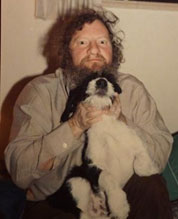
Robert and Willie
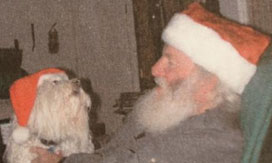
Robert and Mickey
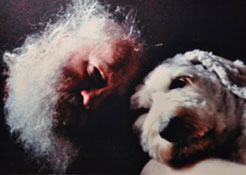
Robert and Jesse